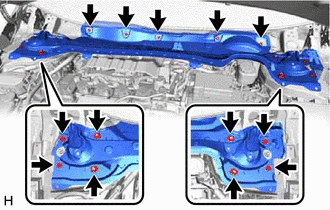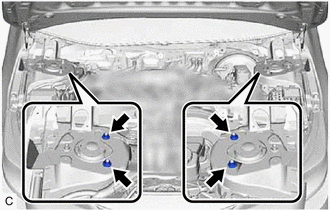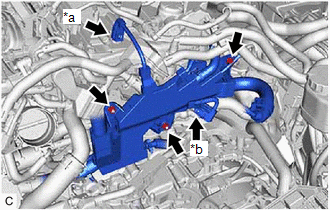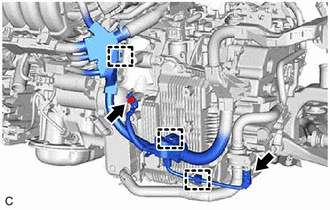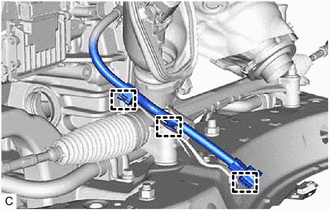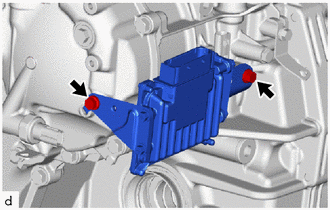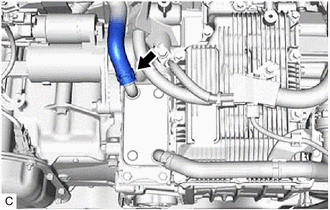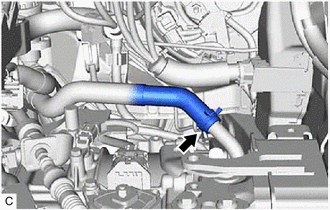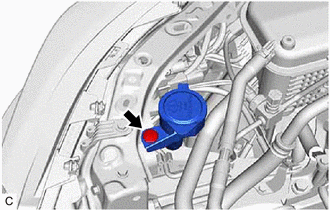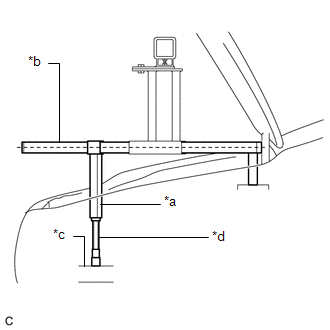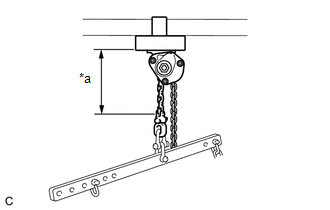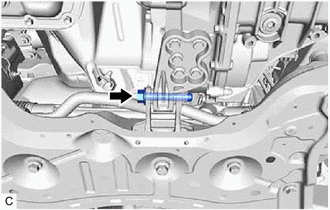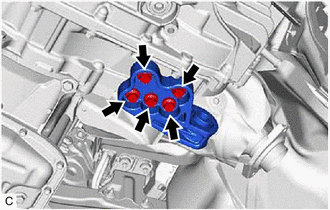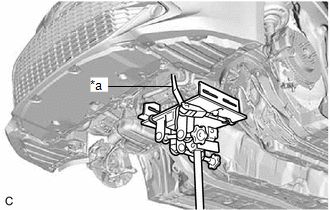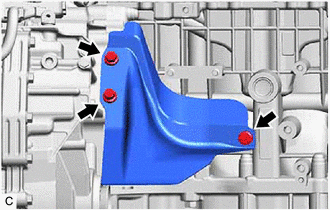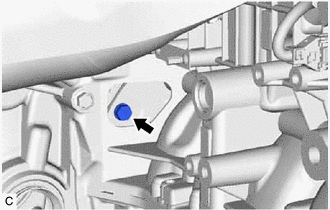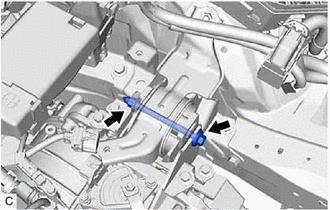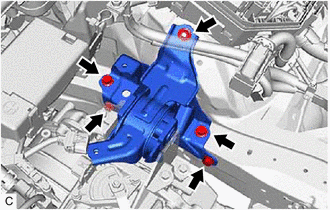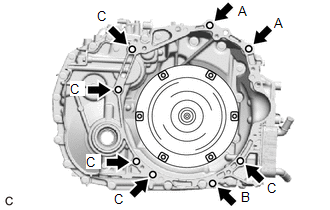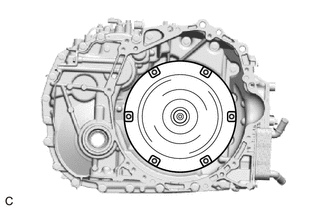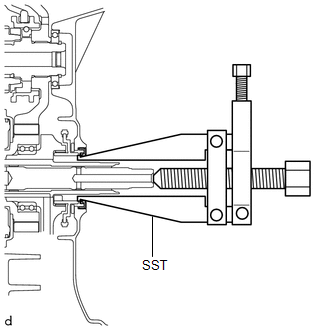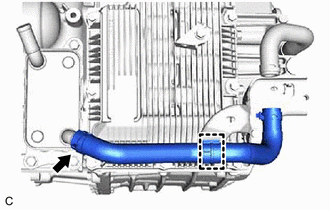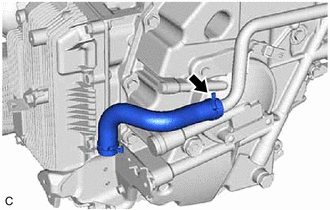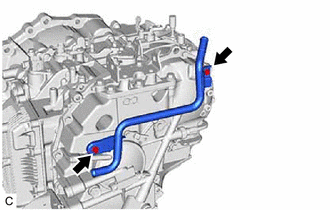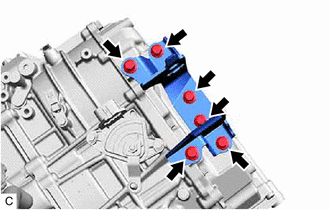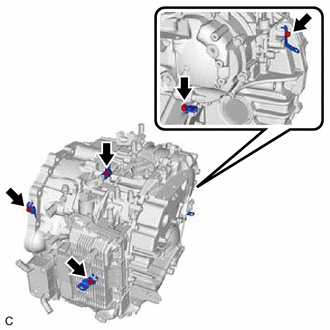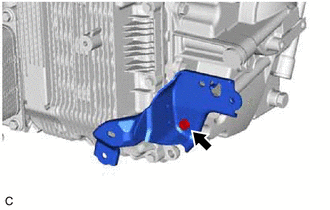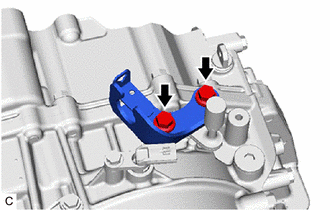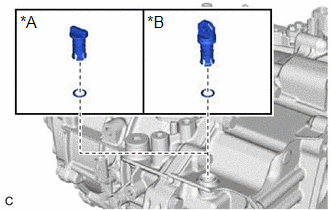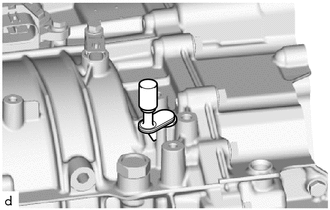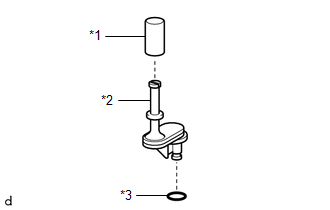- Replacement of engine assembly
- Gas leak from exhaust system is repaired
| Last Modified: 05-13-2024 | 6.11:8.1.0 | Doc ID: RM100000001WP5L |
| Model Year Start: 2022 | Model: Corolla Hatchback | Prod Date Range: [06/2021 - 09/2022] |
| Title: K120 / K121 (CVT): CONTINUOUSLY VARIABLE TRANSAXLE ASSEMBLY: REMOVAL; 2022 MY Corolla Corolla Hatchback [06/2021 - 09/2022] | ||
REMOVAL
CAUTION / NOTICE / HINT
The necessary procedures (adjustment, calibration, initialization, or registration) that must be performed after parts are removed and installed, or replaced during continuously variable transaxle assembly removal/installation are shown below.
Necessary Procedure After Parts Removed/Installed/Replaced
|
Replaced Part or Performed Procedure |
Necessary Procedure |
Effect/Inoperative Function when Necessary Procedure not Performed |
Link |
|---|---|---|---|
|
*1: Not necessary when TCM replaced with new one.
*2: If the vehicle height has changed due to suspension or tire replacement. *3: for Hatchback *4: w/o Smart Key System *5: w/ Smart Key System |
|||
|
Battery terminal is disconnected/reconnected |
Perform steering sensor zero point calibration |
Lane Control System (for Gasoline Model) |
|
|
Pre-collision System (for Gasoline Model) |
|||
|
Lighting System (w/ AFS)(EXT) |
|||
|
Initialize back door lock*3 |
Power Door Lock Control System (for Hatchback, Gasoline Model) |
||
|
Replacement of ECM |
Vehicle Identification Number (VIN) registration |
MIL comes on |
|
|
ECU communication ID registration (Immobiliser system) |
Engine start function |
||
|
|
Inspection After Repair |
|
|
|
Replacement of continuously variable transaxle assembly |
|
|
|
|
Replacement of TCM (If transaxle compensation code read from TCM) |
|
||
|
Replacement of TCM (If transaxle compensation code not read from TCM) |
|
||
|
Replacement of ECM |
|
||
|
Replacement of ECM*5 |
Code registration (Smart Key System (for Gasoline Model, Start Function)) |
|
|
|
Replacement of ECM*4 |
Code registration (Immobiliser system) |
Engine start |
|
|
Suspension, tires, etc.*2 |
Perform headlight ECU sub-assembly LH initialization |
Lighting system (w/ AFS)(EXT) |
|
|
Front wheel alignment adjustment |
|
|
|
|
CVT fluid |
ATF thermal degradation estimate reset |
The value of the Data List item "ATF Thermal Degradation Estimate" is not estimated correctly |
|
CAUTION:
-
To prevent burns, do not touch the engine, exhaust pipe or other high temperature components while the engine is hot.
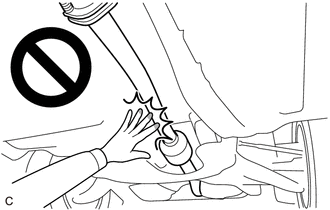
-
Because the continuously variable transaxle assembly is extremely heavy, make sure to follow the work procedures described in the repair manual.
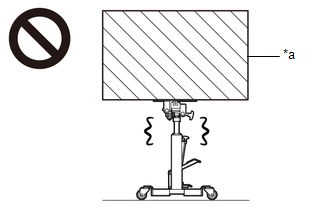
*a
Heavy object exceeding the capacity of the transmission jack
- If work is not performed according to the procedures described in the repair manual, there is a danger that the transmission jack could drop and components could fall down.
NOTICE:
After the ignition switch is turned off, the radio and display receiver assembly records various types of memory and settings. As a result, after turning the ignition switch off, make sure to wait at least 85 seconds before disconnecting the cable from the negative (-) battery terminal. (for Navigation System and Audio and Visual System (for Gasoline Model))
PROCEDURE
1. ALIGN FRONT WHEELS FACING STRAIGHT AHEAD
2. DRAIN ENGINE COOLANT (for Fully Sealed Type)
3. DRAIN ENGINE COOLANT (for Non-Fully Sealed Type)
4. REMOVE FRONT DRIVE SHAFT ASSEMBLY
5. REMOVE WINDSHIELD WIPER MOTOR AND LINK ASSEMBLY
6. REMOVE NO. 1 HEATER AIR DUCT SPLASH SHIELD SEAL
7. REMOVE OUTER COWL TOP PANEL SUB-ASSEMBLY
|
(a) Remove the 9 bolts, 4 nuts and outer cowl top panel sub-assembly. |
|
|
(b) Install the 4 nuts. Torque: 50 N·m {510 kgf·cm, 37 ft·lbf} |
|
8. REMOVE ECM
9. REMOVE BATTERY
10. REMOVE BATTERY CLAMP SUB-ASSEMBLY
11. REMOVE FRONT FLOOR COVER LH
12. REMOVE FRONT FLOOR COVER RH
13. REMOVE FRONT FLOOR CENTER BRACE
14. REMOVE FRONT EXHAUST PIPE ASSEMBLY (TWC: Rear Catalyst)
15. REMOVE STARTER ASSEMBLY
16. DISCONNECT FLOOR SHIFT TRANSMISSION CONTROL SELECT CABLE
17. DISCONNECT ENGINE WIRE
|
(a) Remove the bolt and 2 nuts to disconnect the engine wire from the engine assembly. |
|
(b) Disconnect the camshaft position sensor connector.
(c) Disconnect the engine coolant temperature sensor connector.
|
(d) Disconnect the flow shutting valve (water valve) connector. |
|
(e) Remove the bolt to disconnect the engine wire from the continuously variable transaxle assembly.
(f) Disengage the 3 clamps to disconnect the engine wire from the No. 1 water hose clamp bracket and wire harness clamp bracket.
(g) Disengage the claw, rotate the lever and disconnect the transmission wire connector.
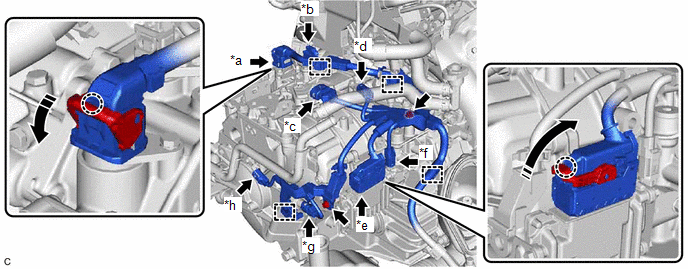
|
*a |
Transmission Wire Connector |
*b |
Shift Stroke Sensor Connector |
|
*c |
Park/Neutral Position Switch Connector |
*d |
Transmission Revolution Sensor (NOUT) Connector |
|
*e |
TCM Connector |
*f |
Transmission Revolution Sensor (NSS) Connector |
|
*g |
Oil Pressure Sensor Connector |
*h |
Transmission Revolution Sensor (NT) Connector |

|
Remove in this Direction |
- |
- |
(h) Disconnect the shift stroke sensor connector.
(i) Disconnect the park/neutral position switch connector.
(j) Disconnect the transmission revolution sensor (NOUT) connector.
(k) Disengage the claw, rotate the lever and disconnect the TCM connector.
(l) Disconnect the transmission revolution sensor (NSS) connector.
(m) Disconnect the oil pressure sensor connector.
(n) Disconnect the transmission revolution sensor (NT) connector.
(o) Remove the 2 bolts to disconnect the engine wire from the continuously variable transaxle assembly.
(p) Disengage the 4 clamps to disconnect the engine wire from the wire harness clamp bracket and No. 1 transmission control cable bracket.
|
(q) Disengage the 3 clamps to disconnect the engine wire from the wire harness clamp bracket. |
|
18. REMOVE TCM
NOTICE:
To prevent coolant from entering the TCM through its connector portion, be sure to remove the TCM before disconnecting any of the coolant system hoses.
|
(a) Remove the 2 bolts and TCM from the continuously variable transaxle assembly. |
|
19. DISCONNECT INLET WATER HOSE
|
(a) Slide the clip and disconnect the inlet water hose from the transmission oil cooler. |
|
20. DISCONNECT WATER BY-PASS HOSE ASSEMBLY
|
(a) Slide the clip and disconnect the water by-pass hose assembly from the No. 3 water by-pass pipe sub-assembly. |
|
21. REMOVE FUEL DELIVERY GUARD
22. INSTALL ENGINE HANGER
23. INSTALL ENGINE SUPPORT BRIDGE
|
(a) Remove the clip and disconnect the inlet hose from the vehicle body. |
|
(b) Install SST (engine support bridge) to the vehicle body as shown in the illustration.
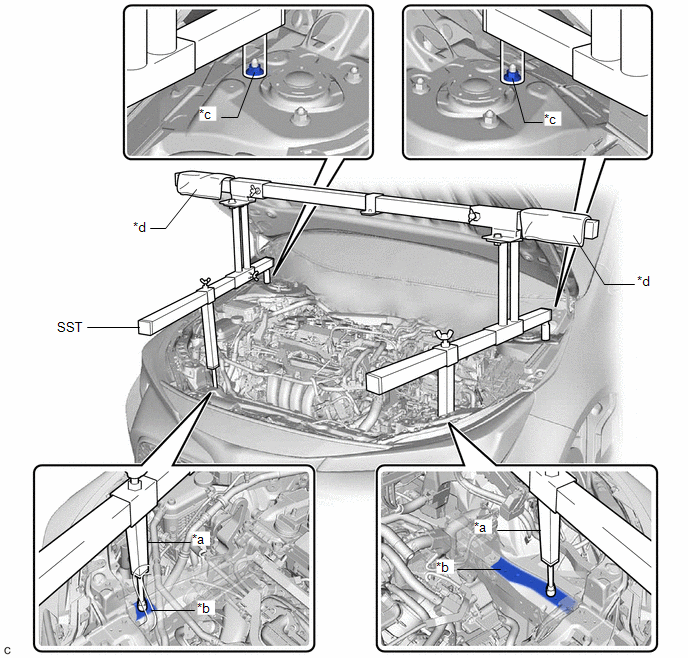
|
*a |
Support Shaft |
*b |
Front Side Member |
|
*c |
Nut |
*d |
Cloth |
SST: 09940-10020
CAUTION:
-
Make sure that the front side member is free of oil and other foreign matter and that the support shaft is set toward the outer side of the front side member.
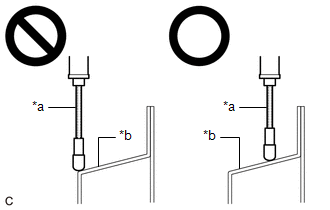
*a
Support Shaft
*b
Front Side Member
- If oil or other foreign matter is attached to the front side member or the support shaft is set on the inner side of the front side member, SST (engine support bridge) may fall.
NOTICE:
- Prevent SST (engine support bridge) from contacting the vehicle body exterior and windshield glass.
- To prevent damage to the engine hood, place pieces of cloth between the engine hood and SST (engine support bridge).
- Lightly shake SST (engine support bridge) by hand to make sure it is securely installed before performing work.
|
(c) Turn the threaded portion of each support shaft to adjust its height until the sub beams are parallel to the ground. |
|
(d) Install the chain block assembly to the sling bracket.
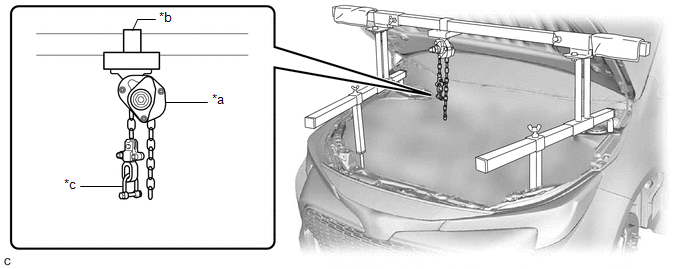
|
*a |
Chain Block Assembly |
*b |
Sling Bracket |
|
*c |
Fuse Shackle |
- |
- |
(e) Install the division bar to the chain block assembly with the shackle (A).
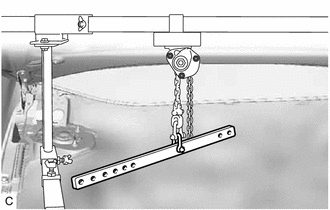
CAUTION:
-
Make sure the fuse shackle is on the chain block assembly side and the shackle (A) is on the division bar side as shown in the illustration so that the fuse bolt is visible and can be checked for deformation easily.
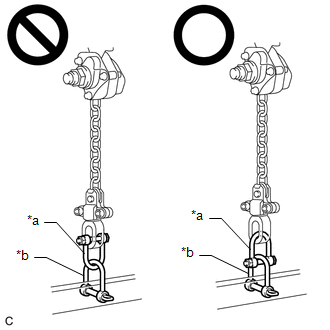
*a
Fuse Shackle
*b
Shackle (A)
- If the fuse shackle is installed upside down, deformation of the fuse bolt will not be visible and cannot be used to tell if the load capacity of the engine support bridge has been exceeded. If the load capacity is exceeded, it may cause the engine support bridge to damage the vehicle and the engine assembly with transaxle assembly may fall.
-
Make sure that the fuse bolt of the fuse shackle is free of damage, such as deformation or cracks. If damaged, replace the fuse shackle.
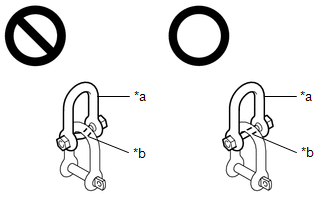
*a
Fuse Shackle
*b
Fuse Bolt
- If a deformed fuse bolt is used, it cannot be used to tell if the load capacity of the engine support bridge has been exceeded. If the load capacity is exceeded, it may cause the engine support bridge to damage the vehicle and the engine assembly with transaxle assembly may fall.
(f) Connect the division bar to the No. 1 engine hanger with the shackle (B).
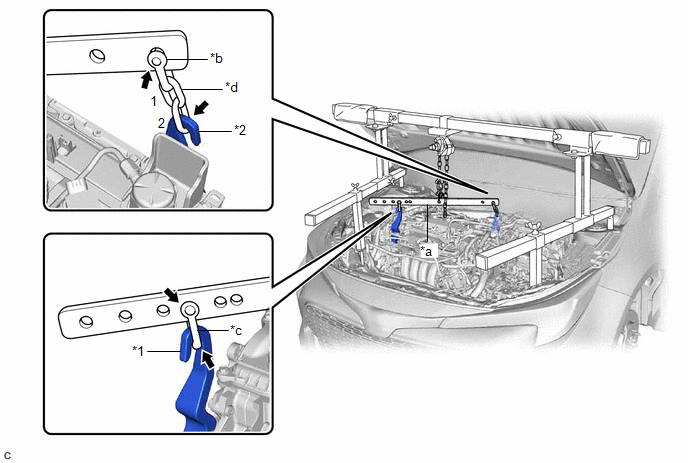
|
*1 |
No. 1 Engine Hanger |
*2 |
No. 2 Engine Hanger |
|
*a |
Division Bar |
*b |
Shackle (A) |
|
*c |
Shackle (B) |
*d |
Chain |
(g) Connect the division bar to the No. 2 engine hanger with the shackle (A) and chain.
NOTICE:
Connect the 2nd link of the chain to the No. 2 engine hanger.
|
(h) Make sure the distance between the chain block assembly and suspension ring is 120 mm (4.72 in.) or more. HINT: If the suspension height is less than 120 mm (4.72 in.), adjust the links of the chain which connect the division bar and engine hanger. |
|
(i) Adjust the positions of the chain block assembly, support brackets and main beam so that the chain of the chain block assembly is perpendicular to the main beam and the length of the main beam on the outer side of the support bracket LH and RH is the same as shown in the illustration.
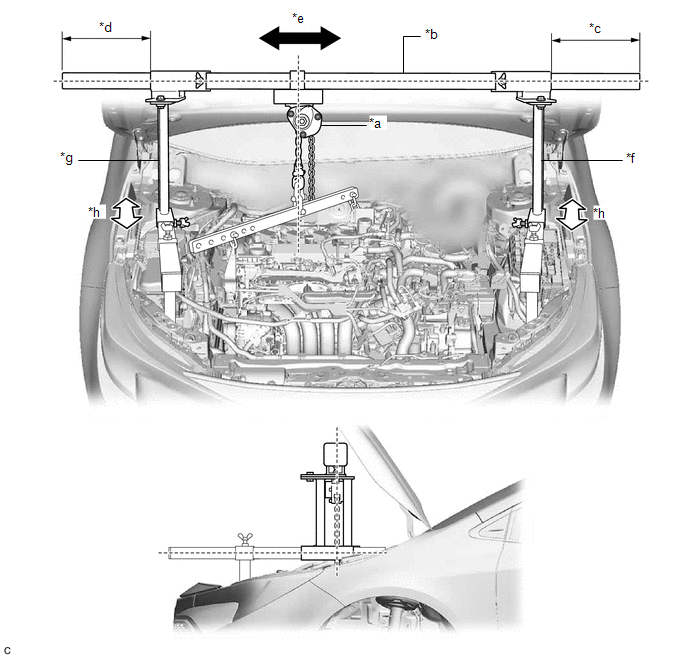
|
*a |
Chain Block Assembly |
*b |
Main Beam |
|
*c |
Dimension (A) |
*d |
Dimension (B) |
|
*e |
Right to Left Adjustment |
*f |
Support Bracket LH |
|
*g |
Support Bracket RH |
*h |
Front to Rear Adjustment |
CAUTION:
-
To prevent the engine assembly with transaxle assembly from falling, make sure that the length of dimension (A) and dimension (B) are equal.
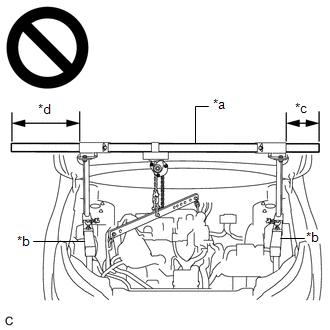
*a
Main Beam
*b
Sub Beam
*c
Dimension (A)
*d
Dimension (B)
- Do not perform any procedures if the length of dimension (A) and dimension (B) are not equal.
- Performing any procedure when the length of dimension (A) and dimension (B) are not equal may cause the engine assembly with transaxle assembly and engine support bridge to fall, possibly causing serious injury.
NOTICE:
-
Do not perform any procedures if the chain of the chain block assembly is not straight.
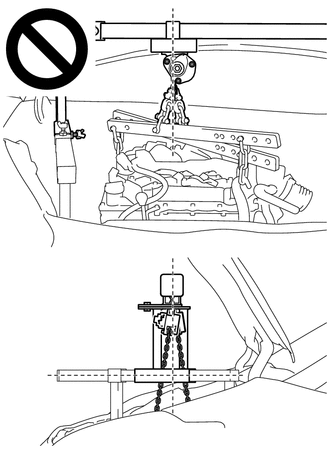
- When removing the engine mount, if the chain of the chain block assembly is not straight, the engine assembly or transaxle assembly may contact the vehicle body.
(j) Confirm the appropriate installation state of the engine support bridge and tighten the 6 wing bolts and 2 bolts.
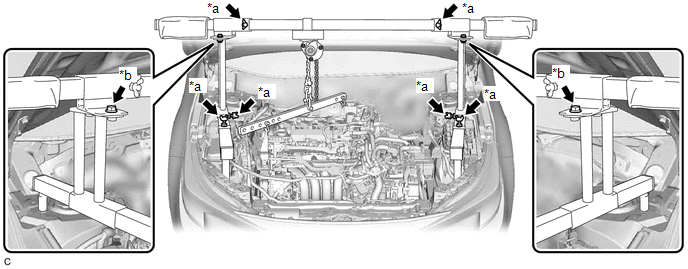
|
*a |
Wing Bolt |
*b |
Bolt |
Torque:
Bolt :
30 N·m {306 kgf·cm, 22 ft·lbf}
CAUTION:
-
Do not perform any procedures before tightening the bolts to the specified torque.
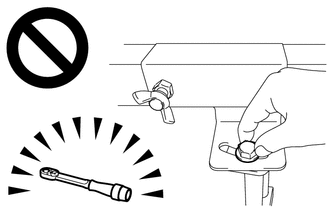
- Performing procedures without tightening the bolts to the specified torque, may cause the engine support bridge to fall.
(k) Tighten the chain block assembly until it cannot be moved any further by hand.
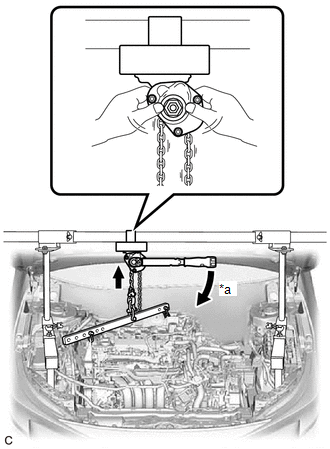
|
*a |
Turn |
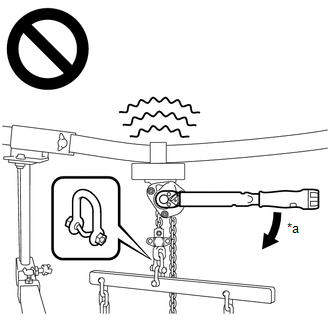
|
*a |
41 N*m (418 kgf*cm, 30 ft.*lbf) or more |
- When suspending the engine assembly with transaxle assembly, do not tighten the chain block assembly more than 41 N*m (418 kgf*cm, 30 ft.*lbf).
- Tightening the chain block assembly more than 41 N*m (418 kgf*cm, 30 ft.*lbf) will cause the load capacity (400 kg (881.8 lb)) to be exceeded and may cause damage to the engine support bridge and vehicle body.
24. SECURE STEERING WHEEL
25. REMOVE COLUMN HOLE COVER SILENCER SHEET
26. SEPARATE NO. 2 STEERING INTERMEDIATE SHAFT ASSEMBLY
27. SEPARATE NO. 1 STEERING COLUMN HOLE COVER SUB-ASSEMBLY
28. REMOVE REAR SIDE RAIL REINFORCEMENT SUB-ASSEMBLY LH
29. REMOVE REAR SIDE RAIL REINFORCEMENT SUB-ASSEMBLY RH
30. REMOVE FRONT SUSPENSION CROSSMEMBER SUB-ASSEMBLY
|
(a) Remove the bolt and separate the engine moving control rod. |
|
(b) Support the front suspension crossmember sub-assembly with an engine lifter using 4 attachments or equivalent tools as shown in the illustration.
CAUTION:
- The front suspension crossmember sub-assembly is a very heavy component. Make sure that it is supported securely.
- If the front suspension crossmember sub-assembly is not securely supported, it may drop, resulting in serious injury.
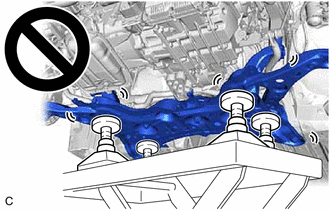
NOTICE:
Use attachments to keep the front suspension crossmember sub-assembly level.
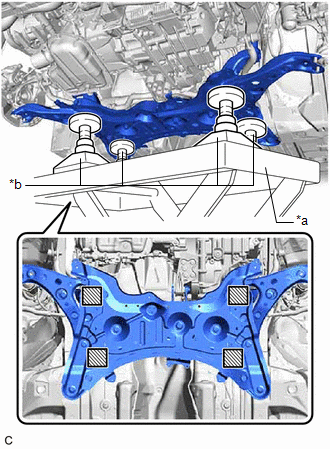
|
*a |
Engine Lifter |
|
*b |
Attachment |

|
Attachment placement location |
(c) Remove the 4 bolts and front suspension crossmember sub-assembly from the vehicle body.
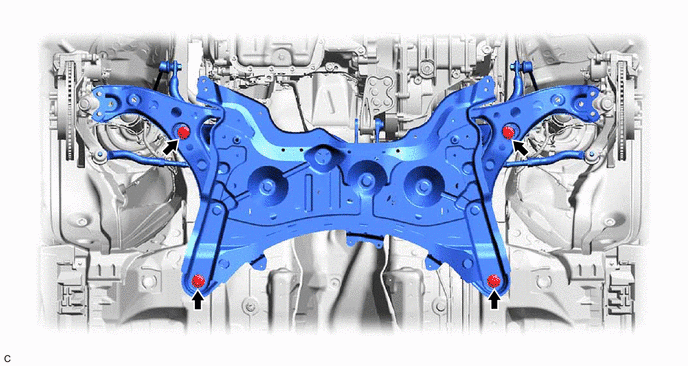
(d) Slowly lower the front suspension crossmember sub-assembly.
NOTICE:
When lowering the front suspension crossmember sub-assembly, be careful not to damage the vehicle body or other components installed to the vehicle.
31. REMOVE NO. 2 ENGINE MOVING CONTROL ROD
|
(a) Remove the 5 bolts and No. 2 engine moving control rod from the continuously variable transaxle assembly. |
|
32. SUPPORT CONTINUOUSLY VARIABLE TRANSAXLE ASSEMBLY
|
(a) Using a transmission jack, support the continuously variable transaxle assembly. NOTICE:
|
|
33. REMOVE MANIFOLD STAY
34. REMOVE DRIVE SHAFT HEAT INSULATOR SUB-ASSEMBLY
|
(a) Remove the 3 bolts and drive shaft heat insulator sub-assembly from the cylinder block sub-assembly. |
|
35. REMOVE FLYWHEEL HOUSING UNDER COVER
(a) Disengage the 2 claws and guide to remove the flywheel housing under cover from the cylinder block sub-assembly.
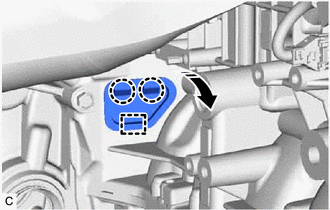

|
Remove in this Direction |
36. REMOVE DRIVE PLATE AND TORQUE CONVERTER ASSEMBLY SETTING BOLT
|
(a) Turn the crankshaft to gain access to the 6 drive plate and torque converter assembly setting bolts and remove each drive plate and torque converter assembly setting bolt while holding the crankshaft pulley bolt with a wrench. HINT: There will be one black colored drive plate and torque converter assembly setting bolt. |
|
37. REMOVE ENGINE MOUNTING INSULATOR LH
|
(a) Remove the through bolt and nut and separate the engine mounting insulator LH from the engine mounting bracket LH. NOTICE: While holding the nut in place, loosen the through bolt. |
|
|
(b) Remove the 4 bolts, nut and engine mounting insulator LH from the vehicle body. |
|
38. REMOVE CONTINUOUSLY VARIABLE TRANSAXLE ASSEMBLY
|
(a) Remove the 8 bolts and continuously variable transaxle assembly from the engine assembly. NOTICE: To prevent damage to the 2 knock pins, do not pry between the continuously variable transaxle assembly and engine assembly. HINT:
|
|
39. REMOVE TORQUE CONVERTER ASSEMBLY
|
(a) Remove the torque converter assembly from the continuously variable transaxle assembly. NOTICE: Remove the torque converter assembly from the input shaft horizontally. |
|
(b) Drain the fluid inside the torque converter assembly (when the torque converter assembly is reusable)
(1) When reusing the torque converter assembly, temporarily leave the torque converter assembly with the drive plate and ring gear sub-assembly installation surface facing up for 1 or 2 hours to drain out any fluid remaining in the torque converter assembly.
HINT:
Due to the structure, it is not possible to completely discharge all the fluid.
40. REMOVE TRANSAXLE HOUSING TYPE T OIL SEAL
NOTICE:
- Clean the work area, the tools to be used, and other equipment, etc. thoroughly before the operation, as there is the possibility that a CVT malfunction, which could prevent the vehicle from being able to be driven, could occur if dust or fine foreign matter enters the CVT.
- Do not use cotton work gloves, cloths, or paper towels, etc. that may produce lint, dust or foreign matter.
- Perform the operation as quickly as possible, as dust and foreign matter could enter the CVT while the torque converter assembly is removed.
- Do not use an air gun until the torque converter assembly has been installed, as it could cause dust and foreign matter to be stirred up.
(a) Clean the tips of both the claws of SST and the center bolt.
SST: 09308-10010
|
(b) Using SST, remove the transaxle housing type T oil seal. NOTICE: Pay attention to the angle of the claws when opening them, and ensure that they do not come into contact with the transaxle housing, as there is the possibility that metal particles could be produced if they do. |
|
41. REMOVE FLOW SHUTTING VALVE (WATER VALVE)
42. REMOVE NO. 4 WATER BY-PASS HOSE
|
(a) Disengage the hose clamp to disconnect the No. 4 water by-pass hose from the No. 1 water hose clamp bracket. |
|
(b) Slide the clip and remove the No. 4 water by-pass hose from the transmission oil cooler.
43. REMOVE NO. 3 WATER BY-PASS HOSE
|
(a) Slide the clip and remove the No. 3 water by-pass hose from the No. 3 water by-pass pipe sub-assembly. |
|
44. REMOVE NO. 3 WATER BY-PASS PIPE SUB-ASSEMBLY
|
(a) Remove the 2 bolts and No. 3 water by-pass pipe sub-assembly from the continuously variable transaxle assembly. |
|
45. REMOVE ENGINE MOUNTING BRACKET LH
|
(a) Remove the 6 bolts and engine mounting bracket LH from the continuously variable transaxle assembly. |
|
46. REMOVE WIRE HARNESS CLAMP BRACKET
|
(a) Remove the 5 bolts and 5 wire harness clamp brackets from the continuously variable transaxle assembly. |
|
47. REMOVE NO. 1 WATER HOSE CLAMP BRACKET
|
(a) Remove the bolt and No. 1 water hose clamp bracket from the continuously variable transaxle assembly. |
|
48. REMOVE NO. 1 TRANSMISSION CONTROL CABLE BRACKET
|
(a) Remove the 2 bolts and No. 1 transmission control cable bracket from the continuously variable transaxle assembly. |
|
49. REMOVE TRANSMISSION CASE PLUG ASSEMBLY
|
(a) Remove the transmission case plug assembly from the continuously variable transaxle assembly. |
|
(b) Remove the O-ring from the transmission case plug assembly.
50. REMOVE BREATHER PLUG SUB-ASSEMBLY
HINT:
Perform this procedure only when replacement of the breather plug sub-assembly is necessary.
|
(a) Remove the breather plug sub-assembly from the continuously variable transaxle assembly. |
|
|
(b) Remove the breather plug cap from the breather plug. |
|
(c) Remove the O-ring from the breather plug.
51. INSPECT TORQUE CONVERTER ASSEMBLY
52. INSPECT DRIVE PLATE AND RING GEAR SUB-ASSEMBLY
|
|
|
![2019 - 2022 MY Corolla Corolla Hatchback GR Corolla [06/2018 - 09/2022]; PRE-COLLISION: PRE-COLLISION SYSTEM (for Gasoline Model): INITIALIZATION](/t3Portal/stylegraphics/info.gif)
